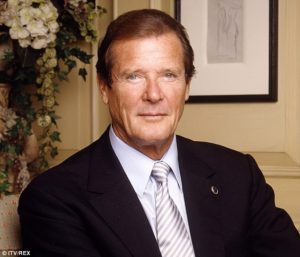Roger Moore – sorry, Sir Roger Moore – seemed to the end of his life to have been bemused at best by his happy, successful life. That Moore seemed to never take himself too seriously may in part account for why so many people believe him to have been the very best of the actors who played James Bond on-screen. I withhold such superlatives, but I understand where they come from: generations who never felt the frisson of seeing Sean Connery embody so impeccably the compound of cruelty, composure and wry sang-froid we who’d read the Ian Fleming novels had imagined 007 to be.
Moore also wore the tuxedo-and-Walther-PPK longer than any of the others who occupied the persona. (Seven movies in all.) So he was the Bond that more people grew up with and, because he was altogether so companionable and charming, grew to adore. Still, Connery remains the preference of Fleming purists and card-carrying boomers (like me).
But though I’m not willing to call Moore the best Bond, I believe he may be the most underrated, which is a far more competitive field when you consider such worthy possibilities as the perpetually-underrated-in-everything-he-does Pierce Brosnan and even George Lazenby, whose single post-Connery shot in 1969’s On Her Majesty’s Secret Service, doesn’t look nearly as bad now as many insisted on believing at the time. Even Lazenby’s co-star Diana Rigg, whose attitude towards Lazenby during filming was, let’s say, less than collegial, now says stuff like “Poor George” when looking back on the experience.
As always, I digress from my main point here – which is that history has already begun to consider Moore’s approach to Bond’s character – thicker on the wry, lighter on the hot stuff – as serving its own array of subtle graces. While he never took himself (or Bond) all that seriously, he brought just enough conviction to draw his audiences into buying even the most outlandish conceits of 1977’s The Spy Who Loved Me, 1981’s For Your Eyes Only, 1983’s Octopussy and all the others.
He was also intelligent enough to recognize early in the game just how absurd it was to sell the idea of someone as altogether conspicuous as James Bond to be a spy. It was almost as though Moore’s Bond resented throughout his tenure how the eponymous villain of Doctor No described Connery’s Bond as being little more than a “stupid policeman.” I may be a bloody policeman, Moore’s 007 seemed to say in all his turns at bat. But I’m not bloody stupid! And he wasn’t.
Here’s what’s odd, though: Sir Roger, though certainly not carrying Richard Burton’s gravitas or Michael Caine’s range in his quiver, had the stuff in him to be even spikier in the Bond role than he was. One example will do: Ffolkes, a 1979 action thriller in which Moore, sporting a “schweppervescent” beard and a chesty, blustery countenance, played a free-lance anti-terrorism expert recruited to dislodge a North Sea oil rig and its inhabitants from the clutches of mercenary kidnappers led by Anthony Perkins and (the also-recently-deceased) Michael Parks. Moore nailed down this cat-fancying grouch with no love for women or any other human being with such confidence that one wonders why he had few other opportunities to show his quirky side, unless you want to count the faultlessly suave self-parodying turn in 1984’s Cannonball Run II where he plays a deluded billionaire named (yeah I know) Seymour, who undergoes plastic surgery to make himself look like Roger Moore.
I’ve also wondered whether Moore’s Bond gig, whatever its assets to both him and the franchise, robbed the world of a great romantic comedy star (Cary Grant on pot, Hugh Grant on codeine). But all that would assume that the romantic comedy genre during Moore’s peak years as Bond would have been worthy of his time and energy. And anyway, it’s not as though the Bonds didn’t give Moore a chance to show some Cary Grant chops; a friend reminded me today of the scene in 1974’s The Man With the Golden Gun when he’s trying to keep Maud Adams from discovering Britt Eckland in the closet. His years in the TV vineyards as Simon Templar and “Cousin Beau” Maverick also left him with a faultless knack for the risqué one-liner. (From For Your Eyes Only: “You get your clothes on and I’ll buy you an ice cream,” he informs someone too young to be in his bed.)
Now not even the action thrillers bother trying to be as witty as romantic comedies used to be. And romantic comedies are even less like what they used to be. It’s all about Getting Even and Getting Over — and you really need to wonder how things got to be the way they are now? If you weren’t bummed by Roger Moore’s passing before, think of where he’d fit in movies now. And keep on thinking until your head starts to hurt — along with your heart.

